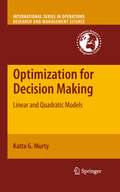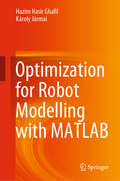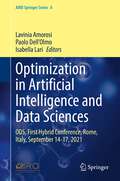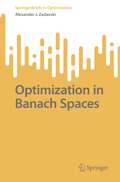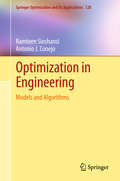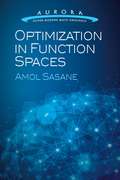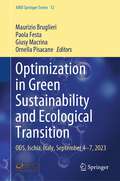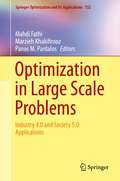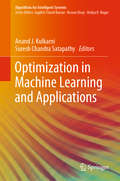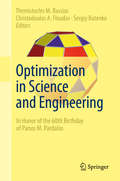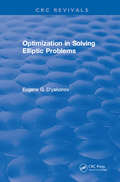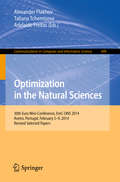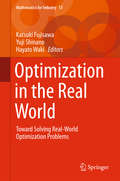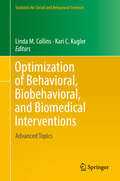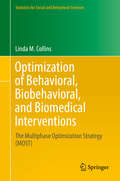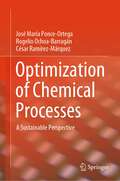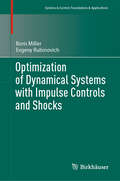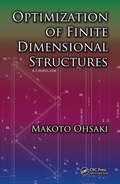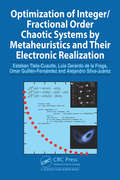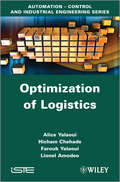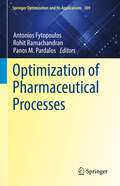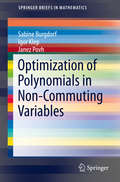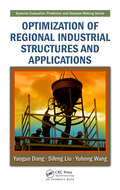- Table View
- List View
Optimization for Decision Making
by Katta G. MurtyLinear programming (LP), modeling, and optimization are very much the fundamentals of OR, and no academic program is complete without them. No matter how highly developed one's LP skills are, however, if a fine appreciation for modeling isn't developed to make the best use of those skills, then the truly 'best solutions' are often not realized, and efforts go wasted. Katta Murty studied LP with George Dantzig, the father of linear programming, and has written the graduate-level solution to that problem. While maintaining the rigorous LP instruction required, Murty's new book is unique in his focus on developing modeling skills to support valid decision making for complex real world problems. He describes the approach as 'intelligent modeling and decision making' to emphasize the importance of employing the best expression of actual problems and then applying the most computationally effective and efficient solution technique for that model.
Optimization for Robot Modelling with MATLAB
by Károly Jármai Hazim Nasir GhafilThis book addresses optimization in robotics, in terms of both the configuration space and the metal structure of the robot arm itself; and discusses, describes and builds different types of heuristics and algorithms in MATLAB. In addition, the book includes a wealth of examples and exercises. In particular, it enables the reader to write a MATLAB code for all the related problems in robotics. The book also offers detailed descriptions of and builds from scratch several types of optimization algorithms using MATLAB and simplified methods, especially for inverse problems and avoiding singularities. Each chapter features examples and exercises to enhance the reader’s comprehension. Accordingly, the book offers the reader a better understanding of robot analysis from an optimization standpoint.
Optimization in Artificial Intelligence and Data Sciences: ODS, First Hybrid Conference, Rome, Italy, September 14-17, 2021 (AIRO Springer Series #8)
by Paolo Dell’Olmo Lavinia Amorosi Isabella LariThis book is addressed to researchers in operations research, data science and artificial intelligence. It collects selected contributions from the first hybrid “Optimization and Decision Science - ODS2021” international conference on the theme Optimization and Artificial Intelligence and Data Sciences, which was held in Rome 14-17 September 2021 and organized by AIRO, the Italian Operations Research Society and the Department of Statistical Sciences of Sapienza University of Rome. The book offers new and original contributions on different methodological optimization topics, from Support Vector Machines to Game Theory Network Models, from Mathematical Programming to Heuristic Algorithms, and Optimization Methods for a number of emerging problems from Truck and Drone delivery to Risk Assessment, from Power Networks Design to Portfolio Optimization. The articles in the book can give a significant edge to the general themes of sustainability and pollution reduction, distributive logistics, healthcare management in pandemic scenarios and clinical trials, distributed computing, scheduling, and many others. For these reasons, the book is aimed not only at researchers in the Operations Research community but also for practitioners facing decision-making problems in these areas and to students and researchers from other disciplines, including Artificial Intelligence, Computer Sciences, Finance, Mathematics, and Engineering.
Optimization in Banach Spaces (SpringerBriefs in Optimization)
by Alexander J. ZaslavskiThe book is devoted to the study of constrained minimization problems on closed and convex sets in Banach spaces with a Frechet differentiable objective function. Such problems are well studied in a finite-dimensional space and in an infinite-dimensional Hilbert space. When the space is Hilbert there are many algorithms for solving optimization problems including the gradient projection algorithm which is one of the most important tools in the optimization theory, nonlinear analysis and their applications. An optimization problem is described by an objective function and a set of feasible points. For the gradient projection algorithm each iteration consists of two steps. The first step is a calculation of a gradient of the objective function while in the second one we calculate a projection on the feasible set. In each of these two steps there is a computational error. In our recent research we show that the gradient projection algorithm generates a good approximate solution, if all the computational errors are bounded from above by a small positive constant. It should be mentioned that the properties of a Hilbert space play an important role. When we consider an optimization problem in a general Banach space the situation becomes more difficult and less understood. On the other hand such problems arise in the approximation theory. The book is of interest for mathematicians working in optimization. It also can be useful in preparation courses for graduate students. The main feature of the book which appeals specifically to this audience is the study of algorithms for convex and nonconvex minimization problems in a general Banach space. The book is of interest for experts in applications of optimization to the approximation theory.In this book the goal is to obtain a good approximate solution of the constrained optimization problem in a general Banach space under the presence of computational errors. It is shown that the algorithm generates a good approximate solution, if the sequence of computational errors is bounded from above by a small constant. The book consists of four chapters. In the first we discuss several algorithms which are studied in the book and prove a convergence result for an unconstrained problem which is a prototype of our results for the constrained problem. In Chapter 2 we analyze convex optimization problems. Nonconvex optimization problems are studied in Chapter 3. In Chapter 4 we study continuous algorithms for minimization problems under the presence of computational errors. The algorithm generates a good approximate solution, if the sequence of computational errors is bounded from above by a small constant. The book consists of four chapters. In the first we discuss several algorithms which are studied in the book and prove a convergence result for an unconstrained problem which is a prototype of our results for the constrained problem. In Chapter 2 we analyze convex optimization problems. Nonconvex optimization problems are studied in Chapter 3. In Chapter 4 we study continuous algorithms for minimization problems under the presence of computational errors.
Optimization in Engineering
by Antonio J. Conejo Ramteen SioshansiThis textbook covers the fundamentals of optimization, including linear, mixed-integer linear, nonlinear, and dynamic optimization techniques, with a clear engineering focus. It carefully describes classical optimization models and algorithms using an engineering problem-solving perspective, and emphasizes modeling issues using many real-world examples related to a variety of application areas. Providing an appropriate blend of practical applications and optimization theory makes the text useful to both practitioners and students, and gives the reader a good sense of the power of optimization and the potential difficulties in applying optimization to modeling real-world systems. The book is intended for undergraduate and graduate-level teaching in industrial engineering and other engineering specialties. It is also of use to industry practitioners, due to the inclusion of real-world applications, opening the door to advanced courses on both modeling and algorithm development within the industrial engineering and operations research fields.
Optimization in Function Spaces (Aurora: Dover Modern Math Originals)
by Prof. Amol SasaneThis highly readable volume on optimization in function spaces is based on author Amol Sasane's lecture notes, which he developed over several years while teaching a course for third-year undergraduates at the London School of Economics. The classroom-tested text is written in an informal but precise style that emphasizes clarity and detail, taking students step by step through each subject. Numerous examples throughout the text clarify methods, and a substantial number of exercises provide reinforcement. Detailed solutions to all of the exercises make this book ideal for self-study. The topics are relevant to students in engineering and economics as well as mathematics majors. Prerequisites include multivariable calculus and basic linear algebra. The necessary background in differential equations and elementary functional analysis is developed within the text, offering students a self-contained treatment.
Optimization in Green Sustainability and Ecological Transition: ODS, Ischia, Italy, September 4–7, 2023 (AIRO Springer Series #12)
by Paola Festa Maurizio Bruglieri Giusy Macrina Ornella PisacaneThis book collects selected contributions of the “Optimization and Decision Science - ODS2023” international conference on the theme of optimization in green sustainability and ecological transition. ODS2023 was held in Ischia, 4–7 September 2023, and was organized by AIRO, the Italian Operations Research Society. The book offers new and original contributions on operations research, optimization, decision science, and prescriptive analytics from both a methodological and applied perspectives with a special focus on SDG related topics.It provides a state-of-the art on problem models and solving methods to address a widely class of real-world problems, arising in different application areas such as logistics, transportation, manufacturing, health, ICT and mobile networks, and emergency/disaster management. In addition, the scientific works collected in this book aim at providing significant contributions in the themes of sustainability, traffic and pollution reductions, and energy management.This book is aimed primarily at researchers and Ph.D. students in the Operations Research community. However, due to its interdisciplinary contents, this book is of high interest also for students and researchers from other disciplines, including artificial intelligence, computer sciences, finance, mathematics, and engineering as well as for practitioners facing complex decision-making problems in logistics, manufacturing production, and services.
Optimization in Large Scale Problems: Industry 4.0 and Society 5.0 Applications (Springer Optimization and Its Applications #152)
by Panos M. Pardalos Marzieh Khakifirooz Mahdi FathiThis volume provides resourceful thinking and insightful management solutions to the many challenges that decision makers face in their predictions, preparations, and implementations of the key elements that our societies and industries need to take as they move toward digitalization and smartness. The discussions within the book aim to uncover the sources of large-scale problems in socio-industrial dilemmas, and the theories that can support these challenges. How theories might also transition to real applications is another question that this book aims to uncover. In answer to the viewpoints expressed by several practitioners and academicians, this book aims to provide both a learning platform which spotlights open questions with related case studies. The relationship between Industry 4.0 and Society 5.0 provides the basis for the expert contributions in this book, highlighting the uses of analytical methods such as mathematical optimization, heuristic methods, decomposition methods, stochastic optimization, and more. The book will prove useful to researchers, students, and engineers in different domains who encounter large scale optimization problems and will encourage them to undertake research in this timely and practical field. The book splits into two parts. The first part covers a general perspective and challenges in a smart society and in industry. The second part covers several case studies and solutions from the operations research perspective for large scale challenges specific to various industry and society related phenomena.
Optimization in Machine Learning and Applications (Algorithms for Intelligent Systems)
by Suresh Chandra Satapathy Anand J. KulkarniThis book discusses one of the major applications of artificial intelligence: the use of machine learning to extract useful information from multimodal data. It discusses the optimization methods that help minimize the error in developing patterns and classifications, which further helps improve prediction and decision-making. The book also presents formulations of real-world machine learning problems, and discusses AI solution methodologies as standalone or hybrid approaches. Lastly, it proposes novel metaheuristic methods to solve complex machine learning problems. Featuring valuable insights, the book helps readers explore new avenues leading toward multidisciplinary research discussions.
Optimization in Practice with MATLAB® for Engineering Students and Professionals
by Achille MessacOptimization in Practice with MATLAB® provides a unique approach to optimization education. It is accessible to both junior and senior undergraduate and graduate students, as well as industry practitioners. It provides a strongly practical perspective that allows the student to be ready to use optimization in the workplace. It covers traditional materials, as well as important topics previously unavailable in optimization books (e. g. , Numerical Essentials - for successful optimization). Written with both the reader and the instructor in mind, Optimization in Practice with MATLAB® provides practical applications of real-world problems using MATLAB®, with a suite of practical examples and exercises that help the students link the theoretical, the analytical, and the computational in each chapter. Additionally, supporting MATLAB® m-files are available for download via www. cambridge. org. messac. Lastly, adopting instructors will receive a comprehensive solution manual with solution codes along with lectures in PowerPoint with animations for each chapter, and the text's unique flexibility enables instructors to structure one- or two-semester courses.
Optimization in Science and Engineering
by Sergiy Butenko Themistocles M. Rassias Christodoulos A. FloudasOptimization in Science and Engineering is dedicated in honor of the 60th birthday of Distinguished Professor Panos M. Pardalos. Pardalos's past and ongoing work has made a significant impact on several theoretical and applied areas in modern optimization. As tribute to the diversity of Dr. Pardalos's work in Optimization, this book comprises a collection of contributions from experts in various fields of this rich and diverse area of science. Topics highlight recent developments and include: Deterministic global optimization Variational inequalities and equilibrium problems Approximation and complexity in numerical optimization Non-smooth optimization Statistical models and data mining Applications of optimization in medicine, energy systems, and complex network analysis This volume will be of great interest to graduate students, researchers, and practitioners, in the fields of optimization and engineering.
Optimization in Solving Elliptic Problems
by Eugene G. D'yakonovOptimization in Solving Elliptic Problems focuses on one of the most interesting and challenging problems of computational mathematics - the optimization of numerical algorithms for solving elliptic problems. It presents detailed discussions of how asymptotically optimal algorithms may be applied to elliptic problems to obtain numerical solutions meeting certain specified requirements. Beginning with an outline of the fundamental principles of numerical methods, this book describes how to construct special modifications of classical finite element methods such that for the arising grid systems, asymptotically optimal iterative methods can be applied. Optimization in Solving Elliptic Problems describes the construction of computational algorithms resulting in the required accuracy of a solution and having a pre-determined computational complexity. Construction of asymptotically optimal algorithms is demonstrated for multi-dimensional elliptic boundary value problems under general conditions. In addition, algorithms are developed for eigenvalue problems and Navier-Stokes problems. The development of these algorithms is based on detailed discussions of topics that include accuracy estimates of projective and difference methods, topologically equivalent grids and triangulations, general theorems on convergence of iterative methods, mixed finite element methods for Stokes-type problems, methods of solving fourth-order problems, and methods for solving classical elasticity problems. Furthermore, the text provides methods for managing basic iterative methods such as domain decomposition and multigrid methods. These methods, clearly developed and explained in the text, may be used to develop algorithms for solving applied elliptic problems. The mathematics necessary to understand the development of such algorithms is provided in the introductory material within the text, and common specifications of algorithms that have been developed for typical problems in mathema
Optimization in the Natural Sciences
by Alexander Plakhov Tatiana Tchemisova Adelaide FreitasThis book constitutes the refereed proceedings of the 30th Euro Mini-Conference, EmC-ONS 2014, held in Aveiro, Portugal, in February 2014. The 13 revised full papers presented were carefully reviewed and selected from 70 submissions. The papers are organized in topical sections on dynamical systems; optimization and applications; modeling and statistical techniques for data analysis.
Optimization in the Real World
by Katsuki Fujisawa Yuji Shinano Hayato WakiThis book clearly shows the importance, usefulness, and powerfulness of current optimization technologies, in particular, mixed-integer programming and its remarkable applications. It is intended to be the definitive study of state-of-the-art optimization technologies for students, academic researchers, and non-professionals in industry. The chapters of this book are based on a collection of selected and extended papers from the "IMI Workshop on Optimization in the Real World" held in October 2014 in Japan.
Optimization of Behavioral, Biobehavioral, and Biomedical Interventions: Advanced Topics (Statistics for Social and Behavioral Sciences)
by Linda M. Collins Kari C. KuglerBehavioral, biobehavioral, and biomedical interventions are programs with the objective of improving and maintaining human health and well-being, broadly defined, in individuals, families, schools, organizations, or communities. These interventions may be aimed at, for example, preventing or treating disease, promoting physical and mental health, preventing violence, or improving academic achievement. This book provides additional information on a principled empirical framework for developing interventions that are more effective, efficient, economical, and scalable. This framework is introduced in the monograph, "Optimization of Behavioral, Biobehavioral, and Biomedical Interventions: The Multiphase Optimization Strategy (MOST)" by Linda M. Collins (Springer, 2018). The present book is focused on advanced topics related to MOST. The chapters, all written by experts, are devoted to topics ranging from experimental design and data analysis to development of a conceptual model and implementation of a complex experiment in the field. Intervention scientists who are preparing to apply MOST will find this book an important reference and guide for their research. Fields to which this work pertains include public health (medicine, nursing, health economics, implementation sciences), behavioral sciences (psychology, criminal justice), statistics, and education.
Optimization of Behavioral, Biobehavioral, and Biomedical Interventions: The Multiphase Optimization Strategy (MOST) (Statistics for Social and Behavioral Sciences)
by Linda M. CollinsThis book presents a framework for development, optimization, and evaluation of behavioral, biobehavioral, and biomedical interventions. Behavioral, biobehavioral, and biomedical interventions are programs with the objective of improving and maintaining human health and well-being, broadly defined, in individuals, families, schools, organizations, or communities. These interventions may be aimed at, for example, preventing or treating disease, promoting physical and mental health, preventing violence, or improving academic achievement. This volume introduces the multiphase optimization strategy (MOST), pioneered at The Methodology Center at the Pennsylvania State University, as an alternative to the classical approach of relying solely on the randomized controlled trial (RCT). MOST borrows heavily from perspectives taken and approaches used in engineering, and also integrates concepts from statistics and behavioral science, including the RCT. As described in detail in this book, MOST consists of three phases: preparation, in which the conceptual model underlying the intervention is articulated; optimization, in which experimentation is used to gather the information necessary to identify the optimized intervention; and evaluation, in which the optimized intervention is evaluated in a standard RCT. Through numerous examples, the book demonstrates that MOST can be used to develop interventions that are more effective, efficient, economical, and scalable.Optimization of Behavioral, Biobehavioral, and Biomedical Interventions: The Multiphase Optimization Strategy is the first book to present a comprehensive introduction to MOST. It will be an essential resource for behavioral, biobehavioral, and biomedical scientists; statisticians, biostatisticians, and analysts working in epidemiology and public health; and graduate-level courses in development and evaluation of interventions.
Optimization of Chemical Processes: A Sustainable Perspective
by José María Ponce-Ortega Rogelio Ochoa-Barragán César Ramírez-MárquezThis textbook introduces readers to a comprehensive framework for the application of deterministic optimization strategies in the field of chemical processes, with a strong emphasis on sustainability.The book establishes a vital connection between fundamental deterministic optimization principles, optimization tools, and real-world application instances, all within the context of environmentally responsible practices. The approach put forth in this book is exceptionally versatile, allowing for the use of many optimization software and deterministic techniques.Contained in the book are many fundamental optimization concepts, encompassing linear programming, nonlinear programming, integer programming, and multi-objective optimization, all tailored to promote sustainable decision-making. Furthermore, the book provides practical examples illustrating the application of these techniques within sustainable chemical processes as tutorials.The textbook also explores the utilization of popular optimization software platforms such as GAMS, MATLAB, and Python, demonstrating how these tools can be leveraged for eco-friendly process optimization. Through this comprehensive framework, readers can not only acquire the skills needed to optimize a wide range of processes but also learn how to do so with sustainability at the forefront of their considerations. This approach streamlines the optimization process, eliminating unnecessary complications along the way and ensuring that environmental and ethical considerations are integral to the decision-making process.
Optimization of Dynamical Systems with Impulse Controls and Shocks (Systems & Control: Foundations & Applications)
by Boris Miller Evgeny RubinovichThis text explores the state-of-the-art in the rapidly developing theory of impulse control and introduces the theory of singular space-time transformations, a new method for studying shock mechanical systems. Two approaches in the theory of impulse control are presented: The first, more traditional approach defines the impulsive action as a discontinuity of phase coordinates depending on the current time, the state preceding the action, and its magnitude. The second requires the use of modern methods for describing dynamical systems - differential equations with measures. The impulse is treated as an idealization of a very short action of high magnitude, which produces an almost abrupt change of phase coordinates. The relation between these two approaches is also discussed, and several applications, both traditional and emerging, are considered. This text is intended for graduate students and researchers in control engineering and optimal control theory for dynamical systems. Readers are assumed to be familiar with the theory of ODEs, optimal control, and functional analysis, though an appendix is included that covers many of the necessary mathematical concepts.
Optimization of Electric-Vehicle Charging: Scheduling and Planning Problems (Advances in Industrial Control)
by Giulio Ferro Riccardo Minciardi Luca Parodi Michela RobbaThis book provides models and methods for the optimal management of electrical vehicles through an interdisciplinary approach that brings together knowledge from the sectors of transportation, manufacturing and smart grids. Optimization of Electric-Vehicle Charging explores several optimization models for the scheduling of electric vehicles in a smart grid. Both discrete-time and discrete-event approaches are considered to minimize tardiness, charging and production costs, on the basis of information like release time, due date, deadline, energy request, and availability of energy generated from renewable sources. Transportation demand is assessed, as well as user-equilibrium-based approaches, for the location of charging stations and for the assignment of users to multiple charging stations. Employing illustrations, tables and examples to elucidate the ideas presented, this book will be of value to researchers and practitioners in the fields of electrical engineering and transportation, as well as to graduate and PhD students.
Optimization of Finite Dimensional Structures
by Makoto OhsakiOriginally developed for mechanical and aeronautical engineering, structural optimization is not so easily applied to civil and architectural engineering, as structures in these fields are not mass products, but more often unique structures planned in accordance with specific design requirements. The shape and geometry of such structures are determ
Optimization of Integer/Fractional Order Chaotic Systems by Metaheuristics and their Electronic Realization
by Esteban Tlelo-Cuautle Alejandro Silva-Juárez Luis Gerardo de la Fraga Omar Guillén Guillén-FernándezMathematicians have devised different chaotic systems that are modeled by integer or fractional-order differential equations, and whose mathematical models can generate chaos or hyperchaos. The numerical methods to simulate those integer and fractional-order chaotic systems are quite different and their exactness is responsible in the evaluation of characteristics like Lyapunov exponents, Kaplan-Yorke dimension, and entropy. One challenge is estimating the step-size to run a numerical method. It can be done analyzing the eigenvalues of self-excited attractors, while for hidden attractors it is difficult to evaluate the equilibrium points that are required to formulate the Jacobian matrices. Time simulation of fractional-order chaotic oscillators also requires estimating a memory length to achieve exact results, and it is associated to memories in hardware design. In this manner, simulating chaotic/hyperchaotic oscillators of integer/fractional-order and with self-excited/hidden attractors is quite important to evaluate their Lyapunov exponents, Kaplan-Yorke dimension and entropy. Further, to improve the dynamics of the oscillators, their main characteristics can be optimized applying metaheuristics, which basically consists of varying the values of the coefficients of a mathematical model. The optimized models can then be implemented using commercially available amplifiers, field-programmable analog arrays (FPAA), field-programmable gate arrays (FPGA), microcontrollers, graphic processing units, and even using nanometer technology of integrated circuits. The book describes the application of different numerical methods to simulate integer/fractional-order chaotic systems. These methods are used within optimization loops to maximize positive Lyapunov exponents, Kaplan-Yorke dimension, and entropy. Single and multi-objective optimization approaches applying metaheuristics are described, as well as their tuning techniques to generate feasible solutions that are suitable for electronic implementation. The book details several applications of chaotic oscillators such as in random bit/number generators, cryptography, secure communications, robotics, and Internet of Things.
Optimization of Logistics
by Lionel Amodeo Farouk Yalaoui Alice Yalaoui Hicham ChehadeThis book aims to help engineers, Masters students and young researchers to understand and gain a general knowledge of logistic systems optimization problems and techniques, such as system design, layout, stock management, quality management, lot-sizing or scheduling. It summarizes the evaluation and optimization methods used to solve the most frequent problems. In particular, the authors also emphasize some recent and interesting scientific developments, as well as presenting some industrial applications and some solved instances from real-life cases.Performance evaluation tools (Petri nets, the Markov process, discrete event simulation, etc.) and optimization techniques (branch-and-bound, dynamic programming, genetic algorithms, ant colony optimization, etc.) are presented first. Then, new optimization methods are presented to solve systems design problems, layout problems and buffer-sizing optimization. Forecasting methods, inventory optimization, packing problems, lot-sizing quality management and scheduling are presented with examples in the final chapters.
Optimization of Pharmaceutical Processes (Springer Optimization and Its Applications #189)
by Panos M. Pardalos Rohit Ramachandran Antonios FytopoulosOptimization of Pharmaceutical Processes presents contributions from leading authorities in the fields of optimization and pharmaceutical manufacturing. Formulated within structured frameworks, practical examples and applications are given as guidance to apply optimization techniques to most aspects of pharmaceutical processes from design, to lab and pilot scale, and finally to manufacturing. The increasing demand for better quality, higher yield, more efficient-optimized and green pharmaceutical processes, indicates that optimal conditions for production must be applied to achieve simplicity, lower costs and superior yield. The application of such methods in the pharmaceutical industry is not trivial. Quality of the final product is of major importance to human health and the need for deep knowledge of the process parameters and the optimization of the processes are imperative. The volume, which includes new methods as well as review contributions will benefit a wide readership including engineers in pharmaceuticals, chemical, biological, to name just a few.
Optimization of Polynomials in Non-Commuting Variables
by Sabine Burgdorf Igor Klep Janez PovhThis bookpresents recent results on positivity and optimization of polynomials innon-commuting variables. Researchers in non-commutative algebraic geometry,control theory, system engineering, optimization, quantum physics andinformation science will find the unified notation and mixture of algebraicgeometry and mathematical programming useful. Theoretical results are matchedwith algorithmic considerations; several examples and information on how to useNCSOStools open source package to obtain the results provided. Results arepresented on detecting the eigenvalue and trace positivity of polynomials innon-commuting variables using Newton chip method and Newton cyclic chip method,relaxations for constrained and unconstrained optimization problems, semidefiniteprogramming formulations of the relaxations and finite convergence of thehierarchies of these relaxations, and the practical efficiency of algorithms.
Optimization of Regional Industrial Structures and Applications (Systems Evaluation, Prediction, and Decision-Making)
by Sifeng Liu Yaoguo Dang Yuhong WangBased on research projects supported by the National Natural Science Foundation of China and Nanjing University of Aeronautics and Astronautics, Optimization of Regional Industrial Structures and Applications provides an authoritative introduction to and survey of the cutting-edge research and applications in industrial structure optimization. Empl
